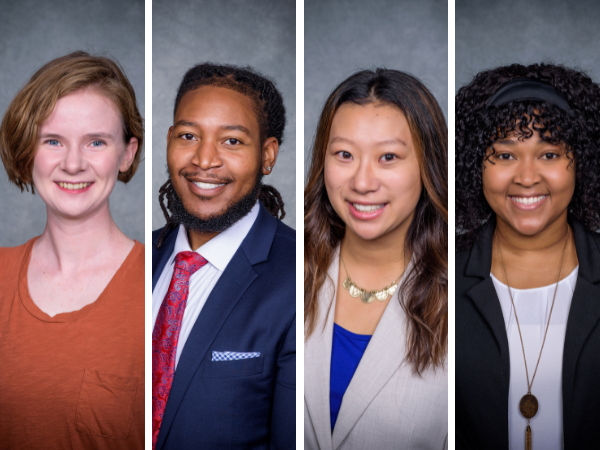by Satina Richardson
Four UAB School of Optometry (UABSO) students have been selected by the Albert Schweitzer Fellowship of Alabama (ASF) to serve as Alabama Schweitzer Fellows. This marks the first time that optometry students at UAB have been selected to participate in the program.
Fellows will spend 13 months immersed in community public health projects. Their projects will improve the health and social well-being of their populations of choice throughout the state while simultaneously strengthening their leadership skills. In doing so, they will continue the legacy of the Fellowship’s namesake, the famed physician-humanitarian Dr. Albert Schweitzer.
Schweitzer Fellowships have an intensive leadership component so that Fellows can continue to inspire others to improve the health of those who experience barriers to care beyond their year of service. ASF Fellows work closely under the guidance of community site partners and academic mentors throughout the project period.
The selected class of 2025 students are:
- Samantha Chapman, OD/MS program
- Demetric Jones, OD/MBA program
- Alice Kim, OD/MPH program
- Lydia Smith, OD program
“These achieving students will build upon experiences providing vision care to underserved populations, which are part of our optometry school curriculum,” said Kelly K. Nichols, dean. Each student will gain knowledge and exposure that will forever impact how they provide care and ultimately contribute to creating healthier communities.”
Chapman hopes to apply the knowledge gained to impact communities outside the United States.
"ASF will allow me to learn how to implement my clinical knowledge within a community -- giving me practice approaching optometry from a public health perspective," she said. "This is essential as I currently hope to practice overseas where I will -- after participating in ASF -- be able to analyze a community's given vision care needs and lend myself to address those needs in the most effective way possible."
Jones will focus on facilitating access to care in underserved communities and be the change he wants to see.
"I've always desired to help underserved communities because I come from a working-class, single-parent home. He said, " I'm rewarded in giving back to populations with social barriers like low-income households, lack of healthcare access, lack of education, racism, poor physical environments, and language barriers. I believe it's important to be the change you want to see."
Kim envisions using this experience to facilitate disease management and prevention.
“As an OD/MPH dual degree student, my interest in population health ties into my motivation to be an optometrist—to make a lasting impact through comprehensive eye services, particularly managing and preventing myopia-related complications and vision loss,” she said. “This fellowship is a symbol of my ultimate goal: to provide excellent eye care to those who are in need and inspire others to do the same.”
Smith discovered optometry through volunteerism and intends to lead impactful community initiatives.
“I found optometry through volunteering with the Lions Club in Virginia,” Smith said. “I have also served alongside several organizations including, but not limited to, the Salvation Army, a community center, a hospice facility, and an environmental center. However, I was not introduced to the process of coordinating these projects, so I applied to the Albert Schweitzer Fellowship to gain this experience. I look forward to being adept in implementing future community projects.”
With 21 students, the 2023-24 cohort is ASF’s largest cohort. This year’s cohort of Fellows from colleges and universities across the state of Alabama constitute an array of health disciplines, including audiology, counseling, dentistry, medicine, nursing, nutrition sciences, optometry, pharmacy, and social work.
It is anticipated that the 21 Alabama Schweitzer Fellows will be joined by approximately 200 other 2023-24 national Schweitzer Fellows working at program sites across the United States. Upon completion of their Fellowship year, the 2023-24 Schweitzer Fellows will become Schweitzer Fellows for Life, joining an active network of Schweitzer alumni continuing their commitment to improving the public health of underserved communities throughout their careers.
